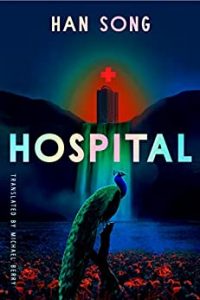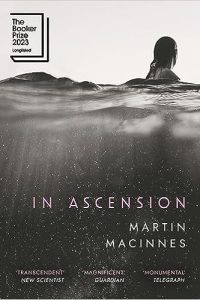Ian Mond Reviews Hospital by Han Song
 Hospital, Han Song (Amazon Crossing 978-1-54203-947-5, $28.99, 414pp, hc) March 2023.
Hospital, Han Song (Amazon Crossing 978-1-54203-947-5, $28.99, 414pp, hc) March 2023.
Summarising the plot of Hospital by Chinese author Han Song (translated by Michael Berry) is a near-impossible task, yet I’m willing to give it a crack. The novel begins in the far future with the SS Mahamayuri heading to Mars to find one of the many Buddhas scattered across the Universe. But after landing on the Red Planet, they discover the ruins of a hospital guarded by voracious ‘‘bird-like creatures’’ bearing the mark of the red cross, who destroy the ship and its crew. The Prologue is just an apéritif to the Kafkaesque weirdness that’s to follow. The opening chapter introduces us to our protagonist, Yang Wei, a government functionary who has enjoyed some success writing songs. He’s been invited to C-City by Company B, commissioned to pen their corporate theme. But after drinking a glass of mineral water, Yang Wei is overcome with stomach pain. The hotel staff transport Wei to the hospital, where he is confronted with an endless number of tests, the Doctors either unwilling or unable to proffer a diagnosis or a course of treatment. Unable to leave the hospital, Yang Wei meets a fellow patient, Ah Bi, who reveals that C-City is an ‘‘experimental district in the latest wave of our nation’s medical reform’’ and that under this reform – known as the Age of Medicine – there are six principles:
One, everyone is sick. Two, patients are useless. Three, all illnesses are untreatable. Four, if you are sick, you must seek treatment. Five, to be without an illness is to be ill. Six, serious ailments are actually like not being sick at all.
That’s just the first third of the novel. As Yang Wei is sucked deeper into the figurative and literal bowels of the Hospital, he confronts an underground world of patients, a sentience living in his stomach, and the startling revelation that the Hospital spans not only the planet but also the cosmos.
If you weren’t aware of the publishing history of Hospital, you could be led to think that the book is a damning critique of China’s COVID Zero policy and the medical fraternity who perpetuate an environment of fear and anxiety about disease and illness (one of the novel’s antagonists is a Dr Bauchi). But you would be wrong. Hospital was published in China in 2016, the first novel in a trilogy completed 18 months before the first case of COVID. And while Song has heavily revised the English version of Hospital in collaboration with his translator Michael Berry, when viewed from a pre-COVID perspective, the novel’s central concerns seem to become about imperialism and authoritarianism. On the former, Song illustrates the insidious way the West (notably America) attempted to influence China through medicine and healthcare, embodied by John D. Rockefeller, who established the first ‘‘modern’’ hospital in China in 1916. On the latter, the strict rules that govern hospitals, especially when curtailing a patient’s freedom, provide the necessary fuel for a dystopian allegory about the Chinese Communist Government.
As much as I admired Hospital and the inventive ways Song tackles these broad themes, it’s a novel I struggled to love. For one, it seemed overly long to me. The disorientating first third becomes increasingly less engaging as Ah Bi and Yang Wei go on a quest that seemed pointless to me, to find a dead Doctor (unlike the patients, they don’t seem to die). I also found Song’s depiction of women hard to digest; they either die violently or are raped (including a sixteen-year-old girl), and the less said about Wei’s fantasies about his daughter, the better. In his excellent Afterword, Berry attempts to justify this treatment by arguing that these distressing passages ‘‘should be read as… how the hospital destroys every conceivable convention of society, of the family, and even of morality itself.’’ And while I’m sure this was Song’s intent, from my perspective, it’s a very patriarchal way of looking at the world, where evil can only be expressed through the suffering of women. Thankfully, the novel’s final third is a remarkable display of the absurd and the cosmic, with what feels like a new, startling idea on every page. It nearly, but not quite, makes up for what struck me as Hospital’s narrative weaknesses.
Still, I can move past my negative experiences with the book when it’s as structurally and thematically ambitious and experimental as Hospital. As I’ve said previously, I read speculative fiction not for the cinematic set pieces and the sense of wonder (though I certainly get a thrill from those) but because, amongst all modes of writing, it’s the one that can radically change how I view the world. Hospital is such a book, which is why I had no hesitation pre-ordering the sequel Exorcism, which will be out later this year.
Ian Mond loves to talk about books. For eight years he co-hosted a book podcast, The Writer and the Critic, with Kirstyn McDermott. Recently he has revived his blog, The Hysterical Hamster, and is again posting mostly vulgar reviews on an eclectic range of literary and genre novels. You can also follow Ian on Twitter (@Mondyboy) or contact him at mondyboy74@gmail.com.
This review and more like it in the May 2023 issue of Locus.
 While you are here, please take a moment to support Locus with a one-time or recurring donation. We rely on reader donations to keep the magazine and site going, and would like to keep the site paywall free, but WE NEED YOUR FINANCIAL SUPPORT to continue quality coverage of the science fiction and fantasy field.
While you are here, please take a moment to support Locus with a one-time or recurring donation. We rely on reader donations to keep the magazine and site going, and would like to keep the site paywall free, but WE NEED YOUR FINANCIAL SUPPORT to continue quality coverage of the science fiction and fantasy field.
©Locus Magazine. Copyrighted material may not be republished without permission of LSFF.






